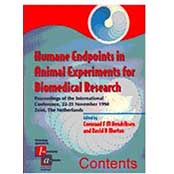Proceedings of the International Conference, 22-25 November 1998 Zeist, The Netherlands
The organising committee of the 1998 International Conference on Humane Endpoints (HEP) in animal experiments for biomedical research in the Netherlands have published a document containing all details of the conference. As the document is quite extensive, it has been broken down into several downloadable pdf-files. Contents: Preface; Acknowledgments; The biomedical sciences and the need for less-inhumane animal procedures; Humane endpoints in animal experimentation for biomedical research: ethical, legal and practical aspects; The OECD Test Guidelines Programme and animal welfare concern: how to avoid major animal suffering; The European Pharmacopoeia and humane endpoints; Human neonates and pain; Criteria for humane endpoints; Physiological and ethological aspects of the assessment of pain, distress and suffering; An Applied approach to the assessment of severity; Practical use of distress scoring systems in the application of humane endpoints; Relating criteria for humane endpoints to objectives; Remote monitoring of experimental endpoints in animals using radiotelemetry and bioimpedance technologies; Using telemetry to study the effects of protectors on doxorubicin-induced cardiotoxicity in freely-moving mice; Humane endpoints and the importance of training; Humane endpoints in toxicity testing; Humane endpoints in cancer research; Urinary biomarkers as humane endpoints in toxicological research; Retrospective evaluation of clinical signs, pathology and related discomfort in chronic studies; Humane endpoints in vaccine research and quality control; Use of clinical signs in efficacy testing of erysipelas vaccines; The evaluation of humane endpoints in pertussis vaccine potency testing; Endotoxin in porcine vaccines: clinical signs and safety aspects; Refinement in vaccine research at CAMR; Determining body temperature using a microchip implant system; Clinical signs predicting imminent death in a rat model of invasive pulmonary aspergillosis; Defining endpoints: the role of the animal care committee; The need to refine the notion of reduction; The re-use of animals for research – a humane endpoint; Summary of the workshops.
